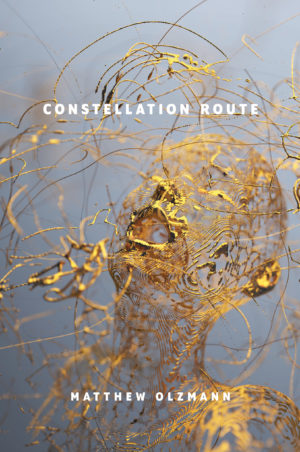Constellation Route
by Matthew Olzmann
reviewed by Adam Scheffler
In his third poetry collection, Constellation Route, Matthew Olzmann writes fiercely and unsparingly about the human knack for anger and destruction. His poems respond to the chaos and ugliness of the Trump era and its aftermath, as well as to the ecological devastation that is becoming humanity’s legacy. “The human hand / can reach from one ruined thing to the next,” Olzmann writes. In a “Letter to Someone Living Fifty Years from Now,” he says, “It must seem like we sought to leave you nothing / but benzene, mercury, the stomachs / of sea gulls rippled with jet fuel and plastic.”
But even as it bears witness to human destructiveness, the book’s conception and framing are hopeful and social. Olzmann structures Constellation Route as a series of letters both realistic—to and from real people and friends—and fantastic—to a river monster or from a flock of pigeons. This epistolary book begins with the famous epigraph found on the front of the James A. Farley Post Office in New York City, “Neither snow nor rain [ … ] stays these couriers [ … ],” and Olzmann threads it through with imaginative riffs on postal terms. He thus makes the social act of letter-writing central to the book, which even contains poem-letters that he tells us were not written by him, but to him from named friends. On the book’s final page, Olzmann states that despite the historical norm of cataclysm and perpetual change, it “stuns me: the way an envelope arrives; how we / still reach toward one another.”
Letters provide the perfect medium for this reaching because people no longer write them often. Thus, they offer a form of sociability that seems more secret and intimate than it does public. They are an alternative to the public “waters / of the internet,” where “all the animals are faster / and more self-righteous than you.” Letters must also physically travel to “connect [ … ] disparate spaces,” and—though the book doesn’t say this explicitly—they don’t require or permit instant responses, as do text and social media messages. They thus acknowledge our distances from one another and speak carefully across those distances, while giving us more time to absorb their messages.
The book’s emphasis on letters, and its love of imaginative, secretive languages, allows us to find in poetry, or in literature more generally, a way to be “aliens together”—to form an alternative social world in whose atmosphere we can finally breathe. Olzmann reminds us that, though writing and reading are solitary acts, they gain their value only as means of communication. Constellation Route starts with an “old man” whose creative vision only gains value when transcribed as a letter: “When it reaches you, / everything begins.” And towards the end of the book, Olzmann imagines his poem as “a small fire” that is “Shy, uncertain” but that “might warm your hands” or “cast a brief light in this duplicitous dark.” “I can’t guarantee even that,” he adds, “But I made it for you / and if you want it, it’s yours.”
The qualifications here—might, though, but—are crucial to making this offer believable, and Olzmann never presents the “small fire” of reading as an infallible solution. Indeed, he sometimes uses the second-person in his letter-poems not to address readers and friends but rather to indict humanity and dramatize our crimes against nature and one another. For example, in “Letter Beginning with Two Lines by Czeslaw Milosz,” a powerful poem about gun violence in America, the speaker addresses a former student who was shot to death after opening his door. “The earth will close // like a door above you,” Olzmann writes, “And that click you hear? / That’s just our voices, // the dead bolt of discourse / sliding into place.” By indicting the gridlocked gun control discourse that often follows mass shootings, Olzmann here suggests that even poetry might be part of that talky click that locks in the dead.
Yet, the poem is so affecting not just because it implicates all of us but also because it is heartbroken: Olzmann’s most unsparing poems always also make us feel love for the world and people whom we harm. In so doing, these poems thaw the grim numbness the news so often induces, and enable us to mourn together.
Published on April 7, 2022

